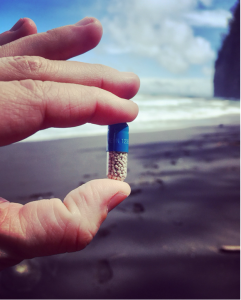Road towards a pancreatitis diagnosis

#Creoninthewild Hawaii
My journey with pancreatitis started when I was about 10 years old. Throughout my years in school (elementary, middle and high school), I was misdiagnosed with a “sensitive stomach.” My pain was not taken seriously by doctors. I was sent to several counselors while I was in college because, despite my symptoms, doctors believed that the pain was in my head. I received prescriptions for chocolate as a way to ‘just calm down’ and let go of some stress. This was probably well-intentioned but clearly did not address the source of my intense pain. (Now that I have a diagnosis, I recognize that stress does, in fact, contribute to my symptoms. This makes counseling sessions a positive and essential part of my care.)
Managing my EPI with pancreatic enzymes
After 19 years of suffering, I was finally diagnosed with recurrent acute pancreatitis and Exocrine Pancreatic Insufficiency (EPI) through a stool test, known as a fecal elastase test. After the pancreatitis and EPI diagnosis, my primary care provider prescribed Creon, a brand of pancreatic enzyme replacement therapy (PERT). When I picked up the first dose, I was shocked at the price tag for these enzymes – even with insurance coverage. I considered rationing the enzyme capsules during the month and focusing on a non-fat or low-fat diet in order to make sure the prescription lasted. Then I discovered the AbbVie Creon On Course program which provides valuable information about taking Creon and also a much-appreciated co-pay card program. What’s great is that other pancreatic enzyme companies have assistance programs as well.
I was expecting an immediate change in my pancreatitis symptoms with pancreatic enzymes, but that was not my experience. After adding pancreatic enzymes to my meals, it still took almost one year for the rest of my gastrointestinal system to recover from years of sub-standard performance due to pancreatitis. I worked with my primary care provider (PCP) over several months to calibrate a dosage that works for me which has helped me to maintain body weight, energy, and joy. I kept a food diary, established a goal weight, and through this process identified foods to avoid, foods to minimize, and foods to increase, which all helped me feel better.
My life on pancreatic enzyme replacement therapy (PERT)
Today my symptoms are generally controlled through diet and lifestyle changes. I realized that those nights I cooked a nice simple meal, rather than eating something from a package, I often felt better the next day. So, I started to become more adventurous in the kitchen. For example, a simple swap for pizza sauce in a jar is a can of diced tomatoes with herbs and spices. I also started to take a very gentle stroll after meals (5-7 minutes, even just around the block) to help keep food moving through my system and not feeling as if it was sitting in my stomach. Sometimes I still have infrequent but severe 10/10 painful flare-ups. When this happens, I have found ways to manage pain by taking opioids and meditating (I recommend the Calm and Headspace apps although there are so many great – free – meditation programs available online). I also get support from a nutritionist and a counselor while my body recovers.
My Advice to Other EPI Patients:
-
You are your own expert
Ask for advice, ask for second opinions, talk to your friends and family. Self-advocacy is a hard and endless task, but it is such an important skill to develop when dealing with EPI. If you feel that an enzyme dose adjustment may help, ask for one. Keep an open mind about alternative therapies and request referrals – I have tried acupuncture (didn’t work for me) and mindfulness (very effective for me) both on the recommendation of my PCP.
-
Find your tribe
Friends and family will become your cheerleaders while you explore this world of healthcare, insurance, and diagnoses. Those close to you often notice different things about your EPI experience that can be helpful. For example, my husband knows that it takes about 30 minutes for an opiate to kick in during my flare. For those first 30 minutes, I am begging to go to the ER but he is able to reassure me that pain relief will come soon and this reassurance has been very helpful in my pain management. I have also found lots of supportive groups on social media and I am open to talking about all things EPI on my Instagram – follow or message @achemistoncreon.
-
Pancreatic enzymes for pancreatitis are a super-food

Liz hiking at Crater Lake National Park free of pain and away from the house (i.e. bathroom) with her Creon.
In the beginning, I used to excuse myself from a group dinner to take my pills privately. Despite some initial embarrassment at having to carry around and constantly take these pills, now I consider them my super life-force. For pancreatitis patients, pancreatic enzyme tablets allow you to enjoy a diverse range of tasty and nutritious foods. Once you are on a good dose (everyone is different!), try adding some of your favorite foods back into your diet. You may be surprised at what your body can accommodate now that you are replacing those enzymes.
-
Focus on the things you can still do/eat and share your successes
Whether it is modifying a favorite recipe to accommodate EPI or finding a new restaurant that has all your favorite foods, celebration of little wins and successful experiences is important. I share my wins on Instagram hashtag #creoninthewild and encourage fellow EPI sufferers and pancreatitis patients to share how pancreatic enzymes are helping them manage disease symptoms that they never thought would be possible at the time of diagnosis.
About the Author
Elizabeth (Liz) Jacobs is a bright and passionate young woman living in San Mateo, California with her husband and her dog Pippin. She received her Ph.D in chemistry but, during her post-doctorate research in chemotherapy discovery, a diagnosis of exocrine pancreatic insufficiency and recurrent acute pancreatitis propelled her to begin a career in patient care and advocacy. She now works as a clinical research coordinator at Stanford University where she helps recruit and support patients in gastrointestinal cancer trials. Through her work, Liz is able to relate to GI patients on a personal level, as EPI is often a complication of gastrointestinal cancers.
Learn More about Pancreatic Enzymes for Pancreatitis
To learn more about EPI and pancreatic enzyme replacement therapy, visit our webpage on EPI, our webinar on pancreatic enzymes, and our Q&A .